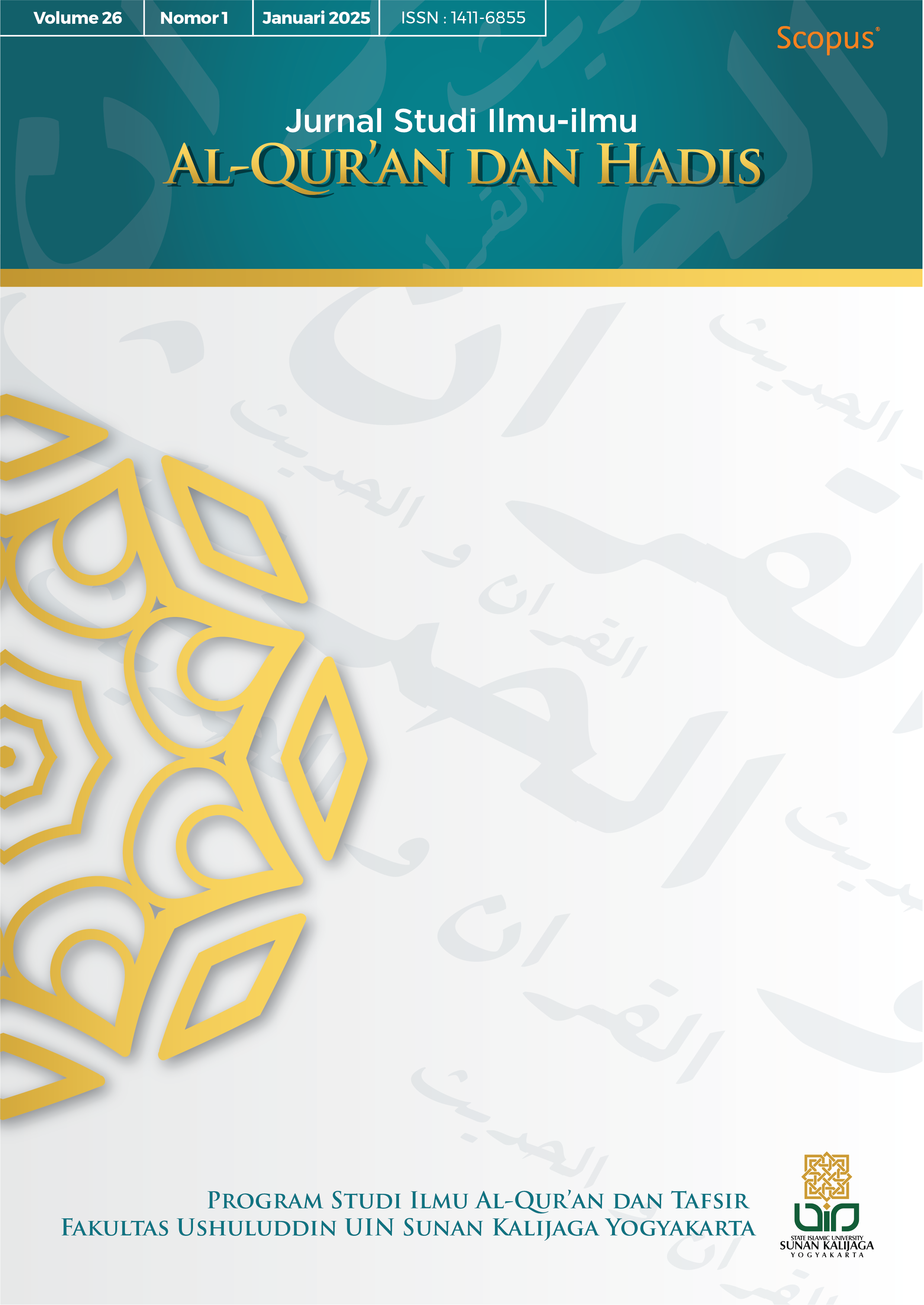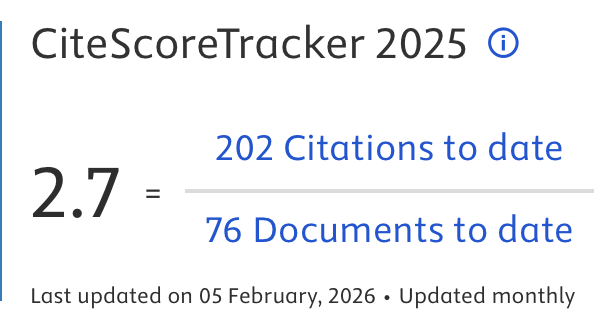Maṭlab al-Ṭālibīn: A Milestone in the Development of Tafsīr Literature in Kashmir
DOI:
https://doi.org/10.14421/qh.v26i1.5640Keywords:
Ya‘qūb Ṣarfī, Maṭlab al-Ṭālibīn, Tafsir, Kashmir, Islamic ThoughtAbstract
This study examines Maṭlab al-Ṭālibīn fī Tafsīr Kalām Rab al-‘Ālamīn, a 16th-century tafsīr work by Ya‘qūb Ṣarfī, which is a significant milestone in the development of tafsīr literature in Kashmir. Despite its substantial influence on Kashmir’s intellectual history, Ṣarfī’s tafsīr has often been overlooked in academic research due to the poor quality of the manuscript and the limited availability of sources. This article adopts a qualitative approach to explore the unique structure of Ṣarfī’s tafsīr, which combines various disciplines such as tafsīr, ḥadīth, fiqh, kalām, and taṣawwuf, and examines how this work connects to the broader tradition of tafsīr in the Islamic world. Through an in-depth analysis of the text and relevant literature, the article demonstrates how Maṭlab al-Ṭālibīn highlights the crucial role of Kashmiri scholars in advancing tafsīr, while also enriching the intellectual discourse of 16th-century Islam. Although incomplete, covering only a small portion of the Qur’an, the work’s contribution is invaluable for understanding tafsīr in the Indian subcontinent, which at the time was influenced by major tafsīr works such as Tafsīr al-Qurtubī and al-Bayḍhāwī. The study also addresses the challenges faced in preserving the manuscript of Maṭlab al-Ṭālibīn, which currently exists in a very fragile condition. The article emphasizes the importance of transcription and conservation efforts to ensure that this work can continue to be studied and analyzed by future generations. Thus, this research not only contributes to the understanding of tafsīr in Kashmir but also broadens the scope of tafsīr studies within the larger Islamic intellectual tradition.
References
Ahmad, Aziz. “Conversions to Islam in The Valley of Kashmir, Central Asiatic Journal, Vol. 23, No. 1/2 (1979).
Ahmad, M.G. Zubaid. The Contribution of India to Arabic Literature. Punjab: Maktaba-i-Din-o-Danish, 1946.
Ahmed, Mushtaq. “Mughal Rule in Kashmir—An Appraisal, Proceedings of the Indian History Congress, Vol. 48 (1987).
Bhat, Manzoor Ahmad. “Shaikh Ya’qub Sarfi (928/1521-1003/1595)”, Insight Islamicus, Vol. 1, No. 1 (2001).
Choughley, Abdul Kader. Tradition of Tafsir (Qur'ānic Exegesis) in the Indian Subcontinent. South Africa: Ahsan Academy of Research, 2021.
Didmarī, Muḥammad A‘azam. Wāqi‘āt-e-Kashmir, translated by Shamsudin Ahmad. Srinagar: Jammu & Kashmir Islamic Research Centre, 2019.
al-Dzahabi,Muhammad Hussein.al-Tafsir wa al-Mufassirun Vol. 1(Cairo: Maktabah Wahbah, nd.)
Jan, G.R. Jāmi‘ al-Kamālāt. Srinagar: KitābMaḥal, 2018.
Kawakib, Kawakib, and Hafidz Syuhud. “Interelasi Akal dan Wahyu: Analisis Pemikiran Ulama Mutakallimin dalam Pembentukan Hukum Islam.” Journal of Islamic Law 2, no. 1 (February 9, 2021): 43–61.
Khan, Mohibul Hasan. “Some Aspects of Kashmir History Under the Shah Mirs and The Chaks”, Proceedings of the Indian History Congress, Vol. 16 (1953).
Kumar, Tribhuwan, Mahyudin Ritonga, and Julhadi Julhadi. “Mother Tongue as a Threat for English Language Learning at Primary Level in Indian Schools: A Survey-Based Study.” Jurnal Ilmiah Peuradeun 10, no. 3 (September 30, 2022): 817–32.
Mursyid, Achmad Yafik. “Endonezya’daki Mushaf Basım Faaliyetlerinin Osmanlı Geleneksel Mushaflarıyla İlişkisi.” İlahiyat Tetkikleri Dergisi, 2020.
Puri, Balraj, “Major Identities of Jammu and Kashmir State, India International Centre Quarterly, Vol. 28, No. 3, (2001).
Rafiqi, Abdul Qaiyum. Sufism in Kashmir. Srinagar: Gulshan Books, 2015.
Schimmel, Annemarie. Islam in the Indian Subcontinent. Leiden: Brill, 1980.
Saleh,Walid. “Periodization in the Sunni Qur’an Commentary Tradition: A Chronological History of a Genre”, The Medieval Globe, Volume 8, Number 2, (2022), 60.
Sa’diyah, Fatichatus. “PEMIKIRAN HADIS SHÂH WALÎ ALLAH AL-DAHLAWÎ TENTANG METODE PEMAHAMAN HADIS.” Jurnal Studi Ilmu-Ilmu Al-Qur’an Dan Hadis 20, no. 2 (November 4, 2019): 163–86.
Sofi, Sameer Ahmad. “Shaikh Yaqub Sarfi of Kashmir: A Case Study of his literary and political contribution” International Journal of Scientific and Research Publications, Vol. 6, Issue 2 (2016).
Sufi, Ghulam Muhyid Din. Kashmīr, Being a History of Kashmir from the Earliest Times to Our Own. Vol. 2. Light & Life Publishers, 1974.
al-Suyūṭī, Jalāludin. al-Itqān fi ‘Ulūm al-Qur’ān (Lebanon: Resalah Publishers, 2008.
Wani, Muhammad Ashraf. Islam in Kashmir. Srinagar: Oriental Publishing House, 2004.
Manuscript Source:
Ṣarfī, Ya‘qūb. Maṭlab al-TalibīnfīTafsīrKalām Rab al ‘Ālamīn, MS No. 4, Department of Libraries and Research, J and K Government.
Downloads
Published
Issue
Section
License
Copyright (c) 2025 Ghazi Nazir Naqash

This work is licensed under a Creative Commons Attribution-NonCommercial-NoDerivatives 4.0 International License.
Publishing your paper with Jurnal Studi Ilmu-ilmu al-Qur'an dan Hadis means that the author or authors retain the copyright in the paper. Jurnal Studi Ilmu-ilmu al-Qur'an dan Hadis uses license CC-BY-NC-ND or an equivalent license as the optimal license for the publication, distribution, use, and reuse of scholarly works. This license permits anyone to copy and redistribute the material in any medium or format and must give appropriate credit, provide a link to the license, and indicate if changes were made. If you remix, translate, transform or build upon the material you may use it for private use only and not for distribution. Jurnal Studi Ilmu-ilmu al-Qur'an dan Hadis granted an exclusive non-commercial reuse license by the author(s), but the author(s) are able to put the paper onto a website, distribute it to colleagues, give it to students, use it in your thesis, etc, so long as the use is not directed at a commercial advantage or toward private monetary gain. The author(s) can reuse the figures and tables and other information contained in their paper published by Jurnal Studi Ilmu-ilmu al-Qur'an dan Hadis in future papers or work without having to ask anyone for permission, provided that the figures, tables, or other information that is included in the new paper or work properly references the published paper as the source of the figures, tables or other information, and the new paper or work is not direct at a private monetary gain or commercial advantage.
Jurnal Studi Ilmu-ilmu al-Qur'an dan Hadis journal Open Acces articles are distrubuted under the Creative Commons Attribution-NonCommercial-NoDerivatives 4.0 International (CC BY-NC-ND 4.0). Article can be read, copy and redistribute the material ini any medium or format under the following conditions:
Attribution — You must give appropriate credit, provide a link to the license, and indicate if changes were made. You may do so in any reasonable manner, but not in any way that suggests the licensor endorses you or your use.
NonCommercial — You may not use the material for commercial purposes.
NoDerivatives — If you remix, transform, or build upon the material, you may not distribute the modified material.











